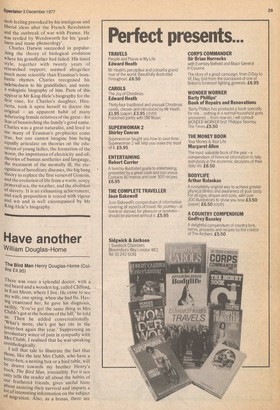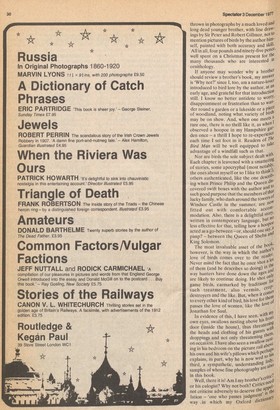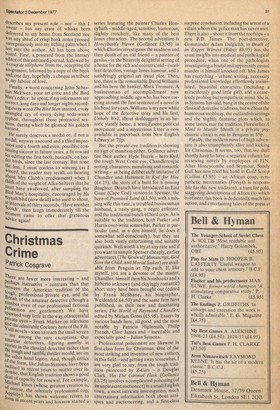Have another
William Douglas-Home
The Bird Man Henry pouglas-Home (Collins 24.95)
There was once a splendid doctor, with a !red beard and a wooden leg, called Clifford, in East Meon, where I live. He, came to see y wife, one spring, when she had flu. Having examined her, he gave his diagnosis, swiftly. 'You've got the same thing as Mrs Clubb's got at the bottom of the hill,' he told Then he added conversationally What's more, she's got her tits in the letter-box again this year.' Suppressing an involuntary wince of pain in sympathy with Mrs Clubb, I realised that he was speaking ornithologically. I tell that tale to illustrate the fact that those, like the late Mrs Clubb, who have a letter-box, a nesting box or a bird table, will be drawn towards my brother Henry's book, The Bird Man, irresistibly. For it not only tells the reader all about the habits of our feathered friends, gives 'useful hints about assisting their survival and imparts a lot ot interesting information on the subject Of migration. Also, as a bonus, there are thrown in photographs by a much loved and long dead younger brother, with line drawings by Sir Peter and Robert Gillmor, not in mention pictures of birds by the author himself, painted with both accuracy and skill. All in all, four pounds and ninety-five pence' well spent on a Christmas present for the many thousands who are interested 01 ornithology. If anyone may wonder why a brother should review a brother's book, my ansvver is 'Why not?' since I, too, am a nature-lover introduced to bird lore by the author, at an early age, and grateful for that introduction still. I know no better antidote to worry' disappointment or frustration than to wal1. der round a garden or a lakeside or a picice of woodland, noting what variety of biros may be on show. And, when one meets rare one, there is no thrill like it, as when observed a hoopoe in my Hampshire gar" den once — a thrill I hope to re-experience each time I set foot in it. Readers of The Bird Man will be well equipped to take advantage of a windfall such as that. Nor are birds the sole subject dealt \Intl' Each chapter is leavened with a smattering of stories, some apocryphal (most notablY• the ones about myself or so I like to think!), others authenticated, like the one deserifr ing when Prince Philip and the Queen discovered swift boxes with the author and W. such good purpose that the members of till lucky family, who dash around the towers°, Windsor Castle in the summer, are nd" fitted out with comfortable acconlmodation. Also, there is a delightful stnrY' written in contemporary language, but II°, less effective for that, telling how a hooll°' acted as a go-between or, should one saY, pimp? — between the Queen of Sheba anw King Solomon.
The most invaluable asset of the however, is the way in which the author ' love of birds comes over to the reader: Never mind the fact that he once shot 01°' of them (and he describes so doing) in theA way hunters have done down the ages air:, are likely to continue doing. He shot 011`11, game birds, earmarked by traditions f° such treatment, also vermin, cr°1; destroyers and the like. But, when it CO,, to every other kind of bird, his love for in passes the love of women, like the love Jonathan for Saul. In evidence of this, I have seen, wit,11111:t own eyes, swallows nesting above his door (inside the house), thus thTeatfh the heads and clothing of his guests droppings and not only threatening i"`„t, on occasion. I have also seen a swallow ne've ing in his bedroom on the picture railab°,,s his own and his wife's pillows which Perhabris explains, in part, why he is now wed to third, a sympathetic, understanding laulsoY samples of whose fine photography are °.
in this book. , rine? Well, there it is! Am I my brother s c eed or his eulogist? Why not both? Critics not criticise adversely to deserve the aPsythe lation — 'one who passes judgment, way , in which my Oxford diet' describes my present role nor this I swear has any crate of whisky been delivered to my home from Scotland nor Was any sheaf of crisp bank notes pressed surreptitiously into my itching palm when I last met the author. All has been above board. First, a postcard from the literary editor of this unbiased journal, followed by a coup de telephone from me, accepting the assignment, followed by a copy of the book and, one day, hopefully, a cheque as tribute to m y labour of love.
Finally, a word concerning John Sebastian McEwen, your art critic and the Bird Man's editor: he spent, if my informants are correct, long days and longer nights recording every word The Bird Man uttered, every strangled cry of every dying soda-water sY, Phon, throughout those protracted sesLsulns, during which he gleaned his golden narvest.
He surely deserves a medal or, if not a medal, anyway a second and a third impression and a fourth and even, possibly, continuing success in future years, a fit reward for editing the first book, basically, on border birds, since the last century. But none the less, I must confess to wincing (as I Winced, the reader may recall, on hearing about Mrs Clubb's predicament) when I think of the weight of Alka-Seltzers that he Must have swallowed, after sampling the Bird Man's hospitality, encouraged by his Mynah bird (now dead) who used to shout, at intervals of thirty seconds, 'Have another S...ct)tch', then laugh immoderately till the 'moment came to offer that gratuitous advice again!
111111111.111Moimmain












































 Previous page
Previous page